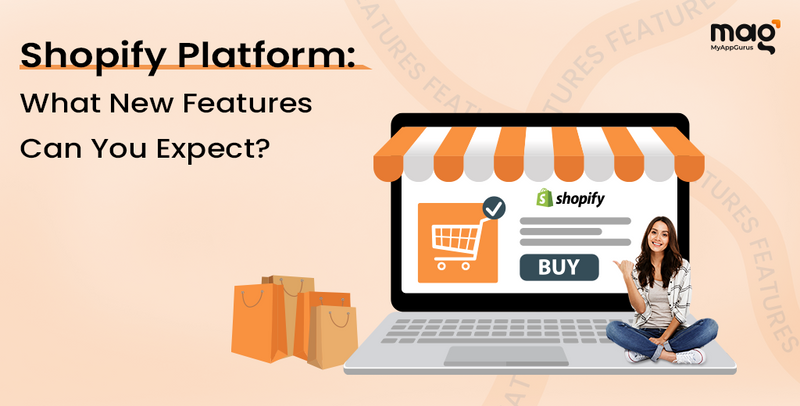Shopify Platform: What New Features Can You Expect?

Shopify is a Canadian e-commerce company. Shopify was established in 2004 by Tobias Lütke, Daniel Weinand, and Scott Lake following an attempt to launch Snowdevil, an e-commerce store for snowboarding gear.
Lütke utilized the software for Snowdevil's online store before choosing to offer it to other retailers.
In 2006, he introduced Shopify, which currently supports more than 500,000 companies across about 175 nations. You can hire Shopify experts to build and design Shopify stores.
What does Shopify refer to?
Shopify is a comprehensive e-commerce platform. It enables individuals to launch, oversee, and expand a business.
Shopify can be used to:
- create an e-commerce platform,
- oversee transactions,
- market to clients, and
- process payments online and in person.
Shopify App development services have developed features and products that support both solopreneurs and enterprise brands, fueling present-day businesses and influencing the future of commerce.
Factors that make choosing Shopify a great option
When beginning a new company or considering switching to a different business partner, there are numerous options available in the market. Does Shopify suit your brand?
Take into account the exclusive advantages listed, then evaluate Shopify in comparison to other e-commerce stores to determine the best fit for your business.
Shopify provides assistance throughout the e-commerce environment.Shopify serves as a hub for a diverse group of entrepreneurs, store owners, developers, and commerce partners.
You can build a custom app by hiring Shopify experts.
Shopify helps you expand internationally.Shopify enables individuals all over the globe to create, link, and grow their businesses. Shopify operates in over 175 countries, offering entrepreneurs everywhere the necessary platform, building blocks, and tools to sell both locally and globally.
Shopify enables individuals to showcase their creativity.Shopify thinks that commerce should include a variety of voices, stories, and experiences.
That is the reason why the product is created with a high level of extensibility, flexibility, customization, and freedom of expression.
Your brand shines brightly.Shopify puts in a lot of effort behind the scenes of your customized online store.
Describe your brand and products through themes that enhance customization, video, and other features to create a unique shopping experience for customers.
Hire Shopify App development services to unlock the features of the Shopify platform.
Shopify is the most comprehensive platform for commerce right from the start.Shopify serves as a hub for commerce businesses and provides access to a versatile range of e-commerce integrations developed with a common technical framework.
This makes sure that Shopify has a wide range and variety of themes, apps, channels, products, and experiences.
What are the latest updates in Shopify?
The updated theme architectureUpgrades were made to the architecture theme of Shopify stores, providing users with increased dynamic customization options.
App developers and Shopify experts have the chance to create fresh integrations in themes with sections and blocks.
Sections (virtually everywhere) in Shopify 2.0.Merchants were constrained to using dynamic sections on the homepage until the Shopify 2.0 features were improved.
The home page was the sole location where you could segment.
In order to replicate the same outcome in other places, merchants would have to recruit developers to modify the code, utilize blocks or meta fields for creating solutions, or employ custom apps. None of these answers were elegant.
With Shopify 2.0, sections can be added to any page except for blog posts. Shop owners have the ability to include additional sections on each page in order to have access to a wider range of customization choices throughout the entire store.
You can even hire Shopify developers to create a custom store.
Store ContentShopify 2.0 reduces the need to hardcode meta fields into themes or use APIs to edit product pages. Theme developers can use dynamic sources to include standard meta fields and established source properties as default options.
Enhanced meta fieldsThe theme editor was updated to let store owners add meta fields and properties without needing an app.
Considering this, the merchant will include any necessary content on product pages.
If the item isn't visible in the main store editor, you can include it by using meta fields.
API for handling files.Developers can now utilize the Files API to access information stored in settings and files.
The GraphQL API enables applications to either upload new or select from existing media content available in Settings/ Files.
Apps now have the ability to populate media metafields with content thanks to the new access available in this specific admin area.
Liquid InputIn Shopify 2.0, the updated theme editor includes a feature called Liquid Input, which allows users to insert custom Liquid code into pages directly within the editor.
The Liquid setting resembles the HTML setting, but it has a key difference: it grants access to Liquid variables for merchants to utilize template-specific and storewide Liquid objects.
Merchants no longer need to manually modify a theme's code, specifically when they need to incorporate code for Liquid-based apps.
With these adjustments, store owners can take advantage of Shopify Store 2.0 benefits and oversee their store without having to involve developers, allowing innovative solutions based on the storeowner's vision.
Wrapping up
Are you prepared to launch a business? Starting on Shopify involves starting with a free trial to help you discover all the features the platform provides.
Hire Shopify developers.Establish your brand, improve your products, and begin connecting with customers for both in-person and online sales immediately.
